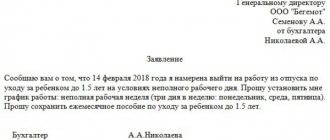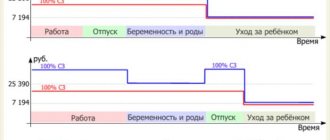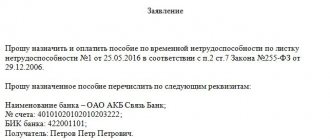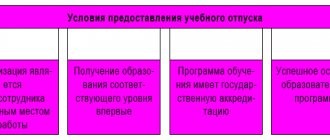Is it possible to leave maternity leave earlier?
An expectant mother can apply for maternity leave in two different ways.
The phrase “maternity leave” is an everyday expression that is not in the law. It characterizes the period of a woman’s legal stay at home, during the period of waiting for a child, birth and until he reaches a certain age.
The legislation, in this case, operates with two concepts:
- Maternity leave (hereinafter referred to as Maternity leave)
- Parental leave (hereinafter referred to as UZR)
The first option, in most cases, is provided at the thirtieth week of pregnancy and its duration, in a normal situation, is 140 days. Their number may be affected by complicated childbirth or multiple pregnancies. But its maximum duration should not be more than 210 days.
Immediately after the obstetrician-gynecologist of the consultation in which you are being observed issues you a certificate of incapacity for work, you can begin to apply for leave under the BiR.
Immediately after the certificate of incapacity for work expires, UzR leave begins, which involves caring for the baby until he reaches three years of age.
Regardless of which vacation you are on, if necessary, you can return to your work position at any time by notifying your employer and sending a corresponding application to his name, indicating the date of release.
But, when planning to return to your position from maternity leave, you need to take into account some points.
Nuances of interrupting vacation under the BiR
It is prohibited by law to interrupt an employee’s vacation at the request of the employer, but if this is the employee’s desire, it must be satisfied.
Practice shows that an employee can only interrupt this leave untimely only after first obtaining the employer’s consent. This point does not contradict the Labor Code in any way, and in most organizations it is regulated by local regulatory documents.
When interrupting vacation early, both the employer and the employee will need to take into account the following: the amount of benefits paid must be recalculated based on the number of working days in relation to vacation days and returned to the social insurance fund.
Nuances of interrupting vacation in Uzbekistan
Any family member who has taken out this leave can take care of the baby.
Whichever member of your family is in it, he has the right to interrupt it at any time and return to work with his preferred schedule. If after some time the decision changes, you can return to maternity leave again. The only thing that is required of you each time you leave it is to write applications addressed to the employer about returning to work.
The legislation allows the use of UzR leave by dividing it into parts. Moreover, several people can take turns caring for a child while on vacation, receiving appropriate payments.
Can they add up?
In this case, the salary (salary) in the month when the replacement day of rest is used is paid in full, without reductions. (letter of Rostrud dated February 18, 2013 No. PG/992-6-1).
The fact that an employee is entitled to time off does not mean that the employee can use it at any time at his discretion. Without agreement with the employer. This conclusion follows from the appeal ruling of the Moscow City Court dated June 18, 2019 No. 33-26458/2019.
- What is required for working on a weekend or holiday - time off or double pay 25:43
- Calculation of additional payment for work on days off with an hourly wage system 14:46
- Calculation of additional payments for a piecework wage system 3:39
- How to pay for recycling 12:34
- How to provide time off for working on holidays and weekends 26:52
- If the business trip falls on the weekend 6:20
- If the vacation fell on weekends and holidays 11:27
- If an employee gets sick on vacation 5:13
- Answers to questions for the webinar 7:33
The Labor Code of the Russian Federation provides for the following reasons for time off:
- Compensation for overtime work, replacement of colleagues (according to Article 153 of the Labor Code of the Russian Federation).
- For work on a weekend or holiday (according to Article 153 of the Labor Code of the Russian Federation). We are talking about officially declared holidays.
- At the request of the employee (On account of vacation, salary).
To attract an employee to work on a day off, compelling reasons are needed, for example, to perform urgent unforeseen work, due to force majeure, to perform work on which the future fate and normal operation of the organization depends.
In the absence of such circumstances, the employee has the right not to perform work on a day off and challenge the situation.
The following are prohibited from working on a day off:
- pregnant women and mothers with children under 3 years of age (according to Article 113 of the Labor Code of the Russian Federation);
- persons under 18 years of age (according to Article 268 of the Labor Code of the Russian Federation).
Even after working part-time, an employee has the right to a day off.
When a written agreement is concluded between the employee and the administration, time off can be added to annual leave. The same procedure works in the opposite direction; the employee must submit an application stating:
- Full name of the addressee of the application.
- Full name of the applicant.
- Text of the request.
- Date and signature.
Wording: “I ask you to make changes to the established vacation schedule and provide me with additional days of rest from 05/10/2018 to 05/20/2018.”
If the application is approved, the employer may issue an order to grant time off, but the word “time off” itself does not appear in the text. Instead they use “day off”, “day of rest”, etc. Document structure:
- A header that contains the name of the document, serial number, according to the document flow.
- The text of the order indicating the basis for the leave.
- Day off date.
- Payment order.
- Procedure for notifying the employee.
- Date and signature of the manager.
Wording: “In connection with the pre-worked day off - 03/05/2018 - I order: I. I. Ivanov to be given a day of rest - 03/10/2018 - in accordance with Art. 153 Labor Code of the Russian Federation. Calculate wages in accordance with this order. The personnel service should familiarize I. I. Ivanov with this order against signature.”
The document is solely for notification purposes; sometimes it is drawn up retroactively or ignored.
The employer reserves the right to refuse time off if:
- The application was submitted too late.
- The text does not indicate a valid reason for taking time off.
- Business trips or emergency situations are planned that require the employee’s assistance.
However, the Labor Code of the Russian Federation guarantees the right to a day off in the following cases:
- Marriage registrations.
- Birth of a child.
- Deaths of relatives.
- Blood donation.
Decision-making on these points, as a rule, shifts towards approval of the application.
This question will be answered, first of all, by an employment contract, which may stipulate such points. If this part is omitted from the contract, then we turn to the Labor Code of the Russian Federation, which states that failure to show up for work is considered by the employer as absenteeism and may be grounds for dismissal or a fine. Article 39 of the Labor Code of the Russian Federation may be grounds for dismissal based on unauthorized use of vacation days.
All absences from work without the approval of superiors are regarded as absenteeism.
In a situation where the employee acted as a blood donor, the employer’s notice of time off is of a notification nature, since, in any case, management will not have good reasons to refuse the day off.
This does not mean that there is no need to inform management, which may be regarded as negligent attitude towards work.
Also, in the event of the death of relatives, if it is not possible to come to the workplace, you need to notify your superiors orally. Based on moral and ethical standards, such cases are almost always approved and do not carry consequences.
If we talk about a paid day of rest on account of regular vacation, the execution of an order is mandatory. It is needed so that HR department employees can enter information about the document, and the accountant can calculate payments due to the employee.
The order must be issued on the organization's letterhead and signed by the head. It must also include the following information:
- Number of rest days and dates;
- Manager and company data;
- Company seal and director's signature;
- Condition for compulsory payment of time off.
The manager may not issue an order if the employee is given time off to account for time already worked. Some organizations have overtime, and they are recorded in a special accounting sheet. If an employee needs days off, he has the right to use them at any time, but the director must be notified about this.
It is worth considering that payment for such vacations is not made.
https://youtu.be/gKg5EyKm0gg
If the employer agrees to give the employee leave on a specified date, then an order is issued by the organization, and he uses this day at his own discretion. Familiarization with the employee's order is mandatory.
When providing a day of rest, it does not matter how many hours the employee worked on a weekend or holiday, time off is given for a full work shift (letter of the Federal Service for Labor and Employment dated October 31, 2008 N 5917-TZ).
The employer does not have the right to limit the period for providing a day of rest by a temporary framework, but it is permissible to provide for the procedure in the collective agreement. Also, the order to hire may indicate the date when the employer will release the employee to rest. If he agrees, he signs the document, and then there is no need to write an additional statement or issue another order.
Days off must be reflected on the time sheet. This is done as follows:
- in the standard form T-12 or T-13 it is coded 28 or NV;
- when independently developing a time sheet within your organization, indicate the code corresponding to these days of rest.
The Labor Code does not contain strict requirements for drawing up timesheets.
But you won’t be able to use annual leave for only part of the day. This is explained by the fact that annual paid leave is provided in calendar days. Therefore, do not accept an employee’s request for half a day of vacation.
Ask to write a full-time application.
The five most difficult questions about vacation at your own expense. Find out who cannot be denied unpaid leave
Find out more
Leave without pay is granted based on the employee’s application. The minimum duration of such rest is not established, so if necessary, an employee can receive it for either several hours or several days. This rule does not apply to annual paid leave.
After an application for half a day at his own expense has been received from the employee and the employer has agreed to provide rest for this time, the personnel officer must draw up an order using the unified form No. T-6 or a form developed and approved by the organization independently. The order is signed by the head of the company. The document is presented to the employee against signature.
Order to grant leave without pay for several hours
Consequences of leaving early
When leaving it in advance, you need to consider the following points:
- an employee who has returned to a full shift from leave under UzR does not have the right to receive appropriate payments, but the one who will look after the child can register them in his own name;
- working on a reduced schedule and working from home provides for the retention of benefits for the employee with additional payment for working hours;
- If you return from vacation untimely, it may be necessary to discuss the issue of who will have to reimburse part of the transferred benefits and in what order.
Payment of wages and required benefits at the same time is prohibited, even with a part-time work schedule.
Review from vacation
What to do if there really is a need for an employee, and he is sent on another vacation? You can resort to another way to attract an employee to work during his official vacation period - to recall him.
Recall from vacation is a legal mechanism that allows a vacationer to be involved in his direct work responsibilities during vacation. The employer cannot force a vacationer to work, but can describe the current situation to him and, if the employee voluntarily agrees, involve him in work.
An employee cannot be recalled to work part-time. Part-time pay is issued only to those who perform their duties part-time, and not to main employees.
If due to production needs the rest is interrupted, the employee is obliged to:
- Begin your duties in full, as specified in the employment agreement.
- Refund previously paid compensation amounts.
According to the law, three days before the start of the vacation period, the vacationer is awarded material compensation for the days taken, which is paid to him in cash or by bank transfer. When recalled from vacation, the employer is obliged to recalculate payments already made, because a person cannot receive two parallel accruals at once: compensation and wages. Previously paid amounts that do not correspond to the time off will have to be returned to the employer. This can be done in cash at the organization’s cash desk or by deduction from future accruals. And the rest days that have not been completed must be given to the recalled employee at a different time or transferred to the next year.
How to exit early
Exiting early includes the following steps:
- Drawing up an application
It indicates the date of entry into the work schedule, as well as the planned operating mode.
- Issuance by the employer of the relevant order
When issuing an order, it is necessary to take into account that it must indicate the employer’s consent to the employee’s early departure, the date of entry into the work position, and an indication of the termination of benefit payments with subsequent payment of wages.
- Familiarization and signing of the order by the employee
Registration procedure
To submit a review, the employer should adhere to the following scheme:
- Provide a written notice of the need for the employee to urgently return to the workplace. It not only describes the reasons for the recall, but also specifies a specific release date. The notice is sent by mail or delivered in person.
- Obtain written consent from the vacationer. Let us note that you cannot immediately force an employee; he has the right to refuse management’s offer. But if he agrees, the vacationer is obliged to state in writing his desire to interrupt his vacation. This can be done at the bottom of the notification or on a separate sheet of paper in any form.
- Having received consent, the employer issues a recall order. The order specifies the employee's exit date.
The issued order will become the basis for the accountant to recalculate preliminary payments, personnel employees will make adjustments to the vacation schedule, and the head of the structural unit will be able to enter work shifts in the time sheet.
Features of early exit from maternity leave up to 3 years
Mom can return to work if the child is under 3 years old
If the baby’s mother decides to go to work without waiting for him to reach the permissible age, someone else may well take care of him: dad, aunt, grandfather, sister, etc. They do not have to be relatives of the child and live together .
Interruption of official leave is possible in any case, regardless of who issued it.
Work restrictions for persons returning from maternity leave early
According to the vacationer, she can work at home or in an organization, but with a limited work schedule. A part-time shift schedule may include the following types:
- daily reduction of hours;
- maintaining the number of hours while reducing working days;
- reduction of a certain number of hours while simultaneously reducing working days.
From the options provided, you can choose the most suitable one for yourself, regardless of your place of work and position.
In addition, women with children under three years of age cannot work on a rotational basis, and nursing mothers cannot be involved in the following types of work activities:
- using disinfectants, detergents and sterilants;
- with gasoline, methyl and any types of dangerous goods;
- heavy physical work associated with increased danger;
- with asphalt concrete mixtures containing surfactants and activators;
- with paints and varnishes;
- organization of maintenance of locomotives and rolling stock.
Cases of return to work
The Labor Code grants the right to an employed citizen caring for a small child to return early from vacation and perform official duties (Part 2 of Article 256).
It is possible to return from maternity leave ahead of schedule in different cases:
- On the initiative of a vacationer.
- At the request of the employer.
In the second case, returning to work is possible only with the written consent of the vacationer.
Not only the mother has the right to care for the child. This can be done by his father or another close relative, for example, a grandmother. The main condition is the actual implementation of care and education independently in the absence of the mother. The return to work rules are the same for all of these individuals.
Is an employee who works during maternity leave entitled to annual leave?
A working woman during the period of leave under the UzR can write an application for the provision of annual leave entitled to her by law. This does not contradict the law, and, with the consent of the employer, it can be formalized in the following ways:
- The employee interrupts her UzR leave and goes on annual leave, at the end of which she can return to UzR leave again.
- An employee stops working part-time during maternity leave.
Thus, the employee will continue to receive benefits, and she will be given the opportunity to take annual leave after leaving maternity leave.
Legislative framework of the issue
The performance of work duties during the vacation period is not established at the legislative level, since vacation is a legal time for proper rest.
However, there are situations when the employee himself wants to earn extra money while on vacation due to financial instability. Or there is an urgent need at the enterprise, when calling an employee is the only way out in the current situation.
In such cases, there are several options for the development of events:
- Recalling an employee from vacation due to operational necessity , for example, during inspections by regulatory authorities, an emergency situation or illness (dismissal) of a replacement employee. This option is the most common.
- Drawing up a civil contract . This option has quite a lot of nuances, so the document must be drawn up in accordance with all the norms of the Russian Labor Code.
At the same time, working part-time while on leave from your main place of work is unacceptable. According to Article 286 of the Labor Code of the Russian Federation, when an employee is on vacation at his main job, he is also given the right to rest while working part-time.
It happens that an employee wants to replace annual leave with monetary compensation and continue to perform his direct job duties. However, this situation is not legal. According to Article 126 of the Labor Code, monetary compensation for the vacation period can only be received if it exceeds 28 days (for example, civil servants whose vacation is 30 calendar days). In this case, by mutual agreement of the parties to the labor relationship, the employee can carry out his work activities while maintaining vacation money and receiving a “gray salary in an envelope” for the days worked. It is worth remembering that this option is illegal, and if it is discovered during an inspection, the management of the enterprise may face administrative liability.
Timing of return to work after maternity period
The employee is given 140 days, after which she can be on UzR leave for another three years. The employee must return to her previously held position immediately after the child turns 3 years old. This can be done on any day, having previously notified the employer of your decision.
Features of the work routine of working mothers
- Women with children under one and a half years old.
Women who have just become mothers are provided with special working conditions
They can exercise the right to breaks during working hours to feed the child. The duration of such breaks should not be more than half an hour if there is one child, and one hour if there are two children. These breaks can be used regardless of the type of feeding. When calculating wages, feeding time is included in the payroll period.
When applying for a job, women in this category are not tested.
- Women with children under three years of age:
The right to refuse to work at night. Despite this, they can be involved in work on rest days, as well as on business trips.
Possibility of going to work during vacation
As mentioned above, working during vacation is legally available only under two options.
In the case when going to work is due to the personal desire of the employee, a civil law contract can be concluded between him and the employer. However, in this case it cannot serve as a disguise for an employment contract. If such an action is detected by the regulatory authorities, the head of the enterprise, according to Article 5.27 of the Administrative Code, faces the imposition of administrative liability.
When drawing up a GPA, certain conditions must be met, namely:
- The work performed should not duplicate the employee’s direct job responsibilities.
- Labor responsibilities should not be guided by the internal rules and staffing schedule of the enterprise.
For example, when concluding a civil contract with a storekeeper, he, in turn, according to the GAP, can perform any work outside the scope of the production process. This could be holding and organizing corporate events, cleaning the territory and other tasks not directly related to his work activity.
If the employee returns to work during vacation, the employee's review must be issued at the request of the employer. This option is the most common because it does not contain any pitfalls.
This situation is regulated by Article 125 of the Labor Code of the Russian Federation. According to the information provided, the employer has the right to early recall a citizen only with his consent. In this case, unused rest days do not “burn out”, but are transferred to another period at the employee’s discretion for the current year or added to the subsequent annual leave.
The law also provides for the employee’s right to refuse the manager’s request. Resolution of the Plenum of the Supreme Court of the Russian Federation No. 2 of March 17, 2004 (as amended on November 24, 2015) “On the application by the courts of the Russian Federation of the Labor Code of the Russian Federation,” paragraph 37 states that a citizen’s refusal to be recalled from legal leave cannot be considered a violation of labor discipline regardless on the reason for this behavior. In this case, the employee has every right, in principle, not to disclose the reason for his decision.
Thus, working during vacation is permissible if the employee agrees to the recall. Otherwise, forcing an early exit without a citizen’s permission is illegal and also entails the imposition of administrative liability on the head of the enterprise.
Is it legal to work while on vacation?
Neither the employer nor the working citizen himself can arbitrarily set the limits of working hours and rest hours. Establishing the required ratio is the responsibility of government agencies, which carefully check the balance of work and rest and regulate it by law. On the territory of the Russian Federation, there are established rules for the ratio of the number of working hours and rest, which make it possible to maintain a high level of working capacity throughout the entire working period. The provided ratios establish the maximum number of working hours per week, and also regulate the amount of compulsory leave.
The Labor Code in Chapter 19 states that every working person must be provided with regular annual leave of at least 28 days. For some workers, additional vacation days are assigned based on assessment of working conditions. In addition, the employer himself, in his local documentation, can set rest times in excess of the required ones.
Everything that is prescribed in the Labor Code of the Russian Federation and the organization’s legal regulations must be strictly observed. Thus, every year the employer must provide each of its employees with the vacation days they are entitled to. In rare cases, if it is impossible to select days this year, it can be transferred to the next calendar period. The transfer must be justified and can take place no more than once every two years.
Compensation for the required vacation period is allowed only if:
- Vacation has been increased by the employer. Anything over 28 minimum days may be eligible for cash benefits.
- We are not talking about additional leaves, which are assigned due to special working conditions.
Since providing rest is the responsibility of the employer, and compensation for the required minimum is prohibited, the logical conclusion suggests itself that it is impossible to combine vacation with work.
What to do if you are forced to work on vacation
It is unlawful to force an employee to work while on vacation. Employees must know their rights and protect them. Legislation does not make it possible to simultaneously pay vacation pay and calculate compensation for work performed, which means that the employee will perform his work duties for free.
The employer has no right to force an employee to work during his legal vacation period, but if this happens, the employee himself has the right to apply for protection of rights to the Labor Inspectorate or court.
Unauthorized absence from work during a formal vacation also cannot be counted as absenteeism, so it makes sense to simply not comply with the unlawful demands of the employer.












